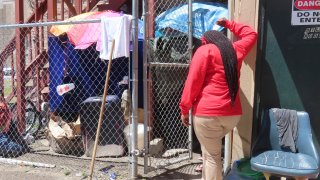
What to Know
- Atlantic City is making an effort to address its homeless population, offering help even while vowing to crack down on people sleeping outdoors on public property.
- In the wake of a U.S. Supreme Court ruling enabling municipalities to ban homeless encampments, Atlantic City plans to enact an ordinance banning sleeping on public property. It could take effect in September.
- City outreach teams offer social services, drug or alcohol rehab, and a temporary place to stay. But many refuse the offers.
In a place with a long history of people living — and sometimes dying — under the Boardwalk, Atlantic City has launched an effort to address homelessness by preventing people from sleeping on public property and connecting them with shelter and services.
The effort comes only days after the U.S. Supreme Court ruled that municipalities can ban homeless encampments, something the city said would support its efforts to address homelessness.
It follows an April 19 fire that killed a man in a homeless encampment under the Boardwalk, months after another fire suspected of being started by homeless people burned a section of the boardwalk in front of Resorts casino. The damage has since been repaired.
Get top local stories in Philly delivered to you every morning. >Sign up for NBC Philadelphia's News Headlines newsletter.
“We cannot claim to be this world-class resort (if) we don't handle the problems that the resort sometimes encounters,” said Mayor Marty Small, a Democrat.
The city is implementing plans by its Boardwalk Improvement Group, which includes using state funds to pay for workers, training and equipment to seek out homeless people and offer them help, including transportation back to where they came from.
But that offer is often rejected. Out of about 200 homeless people that city officials encountered since September, only five have accepted an offer to go back home, officials said.
Local
Breaking news and the stories that matter to your neighborhood.
Many others refuse help of any kind, said Jarrod Barnes, Atlantic City's director of health and human services.
“When that happens, there is nothing we can do,” he said. “We can't force them to accept help.”
A tour by city officials of places known to be where homeless people stay was only minutes old when they encountered a disoriented man sprawled across a sidewalk in the midday sun. An ambulance was called and he was taken to a nearby hospital for evaluation.
Not far away, in a vacant lot strewn with empty liquor bottles, two young women, who both described themselves as homeless, acknowledged having been assisted multiple times by city outreach teams.
Essence, who would not give her last name, said she was given a free stay at a motel by the city, but returned to the streets. At one point, she said, she lived in a homeless encampment under the Boardwalk, until police broke it up.
Tanisha, who also would not give her last name, said she had no idea where she would spend the night on Monday.
“We're just trying to make a way, find a way," she said.
But she acknowledged she and others living outdoors are not always ready to accept help.
“It's really up to us to do what we got to do first,” she said. “The struggle is real.”
In the wake of the Supreme Court ruling, Atlantic City plans to introduce an ordinance in the coming weeks that would prohibit sleeping in public places. It could be adopted and put into place by September.
The outreach effort includes 10 full-time workers assigned to find and interact with people who are homeless, offering social services, a pathway into drug or alcohol rehab if needed, and a place to stay. Police assign officers to regularly patrol spots known as homeless gathering points, and police, fire department and public works officers have been trained on interacting with homeless people.
Small noted that some of the homeless encampments have shown signs of real ingenuity. Refrigerators and microwave ovens have been patched into jerry-rigged electrical connections.
And, he added, inhabitants at one encampment managed to tap into the hose of a line under the Boardwalk providing beer to a casino's beachfront bar.
Sign up for our Breaking newsletter to get the most urgent news stories in your inbox.



